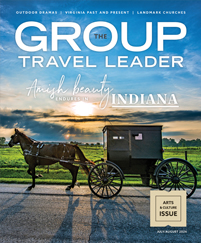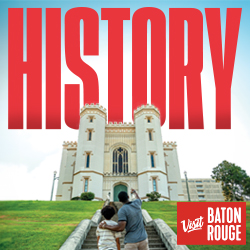Distilling, brewing and winemaking are an integral part of the South’s cultural heritage.
Kentucky is known for its corn-based, barrel-aged whiskey, made using the state’s sweet, blue limestone-filtered water. St. Louis is the birthplace of Budweiser, and in Arkansas, visitors can drink healing hot springs water — in the form of a cold beer. Though the South isn’t as famous for winemaking as its West Coast counterpart, Southern vineyards and wineries are committed to growing grapes and establishing the region as a winemaking destination.
If your groups enjoy sampling local beer, wine and spirits, schedule a trip to one of these distinctive Southern destinations.
Superior Bathhouse Brewery
Hot Springs, Arkansas
The Superior Bathhouse Brewery is the only brewery inside a U.S. national park, and it may be the only one that uses hot springs water in every beer it brews.
When the National Park Service put together a program to allow small, private businesses to lease and repurpose vacant buildings, Rose Schweikhart signed up. She leased a 1916 brick building that had operated as a bathhouse in Arkansas’ Hot Springs National Park until it closed in 1983. The building sat vacant for 30 years until Schweikhart opened her brewery in July 2013.
The park service had partially restored the building, but Schweikhart still had to do about $1 million in phased renovations to make it suitable for a brewery and restaurant.
“One of the parts I’m most proud of is people who did not have access to this building when it was closed — now they do,” she said.
Visitors will find original features like historic tile, exposed brick walls and rows of tiny lockers behind the bar.
Though the production area is too small for tours, a window provides a view into the brewery, where the park service pipes in spring water.
“I turn a valve, and 140-degree spring water comes out,” she said.
During a visit to the park, groups can stop at the brewpub for a beer or the scratch kitchen for a meal; the kitchen uses as much local produce and meat as possible. Superior’s No. 1 seller is the Beer Bath, a tasting flight of all 18 of its beers.
Groups can also reserve the brewery’s private event space, which accommodates up to 100 people, and may be able to arrange for Schweikhart to speak to the group.
Bourbon Distilleries
Bardstown, Kentucky
Kentucky is known for bluegrass, bourbon and Thoroughbreds. And Bardstown is the beating heart of the state’s bourbon scene, with 16 bourbon distillers within 11 miles of downtown.
“What I think is so great about Bardstown is the diversity of our bourbon distilleries,” said Samantha Brady, executive director of Visit Bardstown. “You can go to a small, family-owned distillery then go to a big mecca like Jim Beam and have two completely different experiences.”
Heaven Hill Distillery is undergoing a $17.5 million expansion. The first phase, which was completed in November 2019, included three new tasting rooms and a revamped retail area. The second phase, set to open this spring, will include interactive exhibits and the You Do Bourbon immersive space, where guests can enjoy a tasting, then bottle, label and personalize their favorite bourbon.
Bigger distillers like Four Roses, Jim Beam and Maker’s Mark all offer tours, tastings and group experiences, but the area’s small distilleries are hidden gems. Preservation Distillery produces only two to three barrels a day, but it prides itself on its small-scale, upscale bourbon offerings.
Log Still Distillery is a new operation that’s reviving the owner’s family farm, where his great-great-great-grandfather first made bourbon in 1836. A new tasting room is being built and is scheduled to open this spring. It will anchor the larger destination — called Dant Crossing — which will feature a farm-to-table restaurant, an event space, a 12-acre lake and an amphitheater.
Downtown is its own bourbon destination, home to the Talbott Tavern, the oldest bourbon bar in the world, and the Oscar Getz Museum of Whiskey History. Visitors can walk to the Blind Pig Bourbon Marketplace to buy a bottle of bourbon, then cross the street to the Blind Pig Bourbon Speakeasy, where a password is required to enter.
Outer Banks Distilling
Manteo, North Carolina
Rum and seafaring have a long history, from rum-loving pirates to rum runners during Prohibition to the British sailors who were given daily rum rations.
Outer Banks Distilling, the first legal distillery on the Outer Banks of North Carolina, incorporates that seafaring lore in everything it does. The small rum distillery is in downtown Manteo on Roanoke Island, just a couple of blocks from the water’s edge.
Outer Banks Distilling has a total of eight Kill Devil Rums: three flagship varieties and seasonals and small-batch releases.
Group tours typically begin in the tasting room with an overview of the company and the building, which “we renovated ourselves; it’s all reclaimed wood,” said Scott Smith, co-owner and one of the founders. The building itself ties into the area’s reputation as the Graveyard of the Atlantic — over 1,000 shipwrecks surround the islands — and even has pieces of shipwrecks on display.
“We’re almost like a mini shipwreck museum in here,” Smith said.
A guide leads the group back to the distillery to explain the equipment and the process, from “molasses to glasses” — taking visitors from the raw ingredient to barrel-aging and bottling. The group returns to the tasting room, where the guide leads a tasting.
During the pandemic, North Carolina changed its laws, allowing the distillery to add a full bar and mix drinks. Outer Banks hired a beverage director who makes his own fresh-squeezed juices, tinctures and bitters and creates custom cocktails.
CityScape Winery
Pelzer, South Carolina
Most people get into winemaking because they’re passionate about wine. Josh and Debra Jones got into it for a different reason: boredom. But the passion soon followed. While looking for a hobby — and after watching a lot of YouTube videos about winemaking — the couple took the winemaking plunge. They went to a local winery and winemaking supply store, CityScape Winery, near their home in Greenville, South Carolina.
Boredom birthed a hobby, and the hobby morphed into a lifestyle. The two made dozens of varietals; they even made 10 different types of wine for their wedding.
So when the previous owners of CityScape Winery asked the Joneses to consider taking over the winery in late 2015, they jumped at the chance.
Five years later, the couple is breaking ground on a new 10,000-square-foot facility: 5,000 square feet on the lower level for production and 5,000 square feet upstairs for a tasting room. The building will have plentiful indoor-outdoor access, including a central courtyard and a deck.
The new facility will also have a commercial kitchen, and the Joneses hope to bring in chefs to offer cooking classes. Groups can still schedule guided tours, though the facility will be a construction site until the building is complete this fall.
“The whole thing is going to be filled with lots of experiences,” said Debra Jones. “That’s what we specialize in: the experience.”
The 12-acre property also has large fields, where the winery set up socially distanced tables to accommodate guests during the pandemic.
Landry Vineyards
West Monroe, Louisiana
Landry Vineyards got its start in 1999 when the Landry family — Jeff and Libby Landry and their four sons — planted their first grapes: two acres of Blanc du Bois, a white European American hybrid grape.
Those first vineyards were located in Folsom, Louisiana, about 50 miles north of New Orleans. But after Hurricane Katrina hit in 2005, the family took the opportunity to move to higher ground, relocating to the hill country of West Monroe.
“It’s a much better growing situation up here, much drier,” said owner Jeff Landry.
Though the winery imports some grapes, “we are committed to growing grapes,” he said. “We are not going to have a successful wine industry in Louisiana unless we grow grapes.”
Today, Landry Vineyards’ 20-acre site includes a new winery, a tasting room and 16 acres of vineyards with three different hybrids “that are suitable to our growing situation,” Landry said. The winery offers tours for groups small and large. Smaller groups can ride golf carts down to the vineyards, and larger groups can opt to walk down to see grapes growing on the vines, though they don’t have to.
Guests learn about growing grapes and the winemaking process as a guide leads them through the winery, where they’ll see the equipment and tanks, the barrel-aging room and the bottling room. Groups can taste up to 24 different wines in the tasting room or have a catered meal on the massive, open-air, covered timber pavilion, where a deck delivers views of the vineyard below.
Anheuser-Busch Brewery
St. Louis, Missouri
Anheuser-Busch is one of the biggest names in brewing, and Budweiser is one of the most recognized beers, and it all began in St. Louis. Anheuser’s St. Louis brewery was founded in 1852, making it one of the oldest in the nation, and it has been giving tours to the public for over 130 years.
The brewery’s complimentary tour is available several times a day and is capped at 60 people. The tour starts in the Clydesdale stables, which the Busch family built in 1885. A guide takes guests through the historic 1891 Brew House to learn about the seven-step brewing process, then to the Beechwood aging cellar, where of-age guests can sample Budweiser. The tour wraps up in the open-air Biergarten, where each of the 18 on-tap beers is served in a special glass to highlight its qualities. Although the standard tour is free, the brewery recommends reservations for groups.
Groups have several other options that expand on everything offered in the standard tour. The Day Fresh tour takes visitors through the packaging facility, and each guest leaves with a beer that was brewed that day.
The Beermaster tour provides an in-depth look at the brewing process. Visitors can get close to the brew kettles in the Brew House, taste beer that’s in the process of aging and sample Budweiser straight from the finishing tank in the finishing room.
During Beer School, visitors learn about four different types of ale, as well as proper pouring and tasting techniques, before sampling and tasting food pairings.










